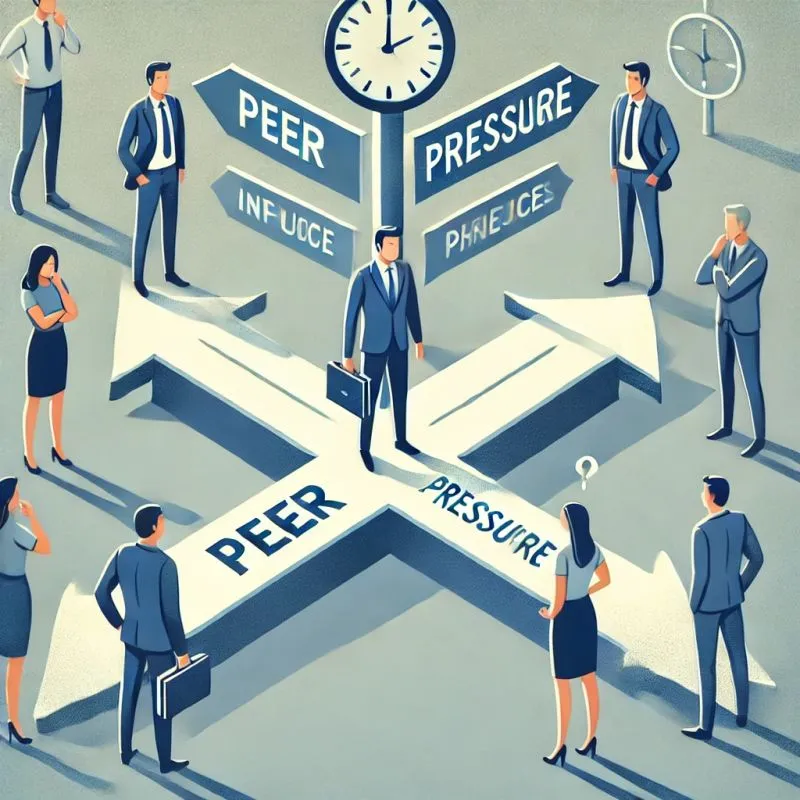Research shows peer pressure continues into early adulthood, affecting our decisions far beyond teenage years. Whether it's joining activities you don't enjoy or compromising your values to fit in, learn practical strategies to stay true to yourself while maintaining healthy relationships.
When 'Just This Once' Becomes a Pattern: Why Peer Pressure Doesn't End in High School
You're at a work happy hour and everyone's pressuring you to have 'just one more drink' even though you're driving. Your friend group keeps insisting you join their expensive weekend trips that strain your budget. Your colleagues expect you to work late constantly to prove your dedication. Peer pressure isn't just a teenage problem—research from the University of Texas at Dallas shows it continues well into early adulthood, affecting our decisions in subtle but significant ways. At LissnUp, we understand that feeling caught between what others want and what feels right for you can be emotionally exhausting. Learning to navigate these situations isn't about becoming antisocial—it's about developing the confidence to maintain your values while building genuine, respectful relationships.
Understanding the Different Faces of Peer Pressure
Direct Pressure: When People Explicitly Ask
This is the obvious kind—friends directly asking you to do something, whether it's trying a substance, joining an activity, or making a decision you're uncomfortable with. While it feels more confrontational, direct pressure is often easier to recognize and respond to because the request is clear and you can prepare your response.
Indirect Pressure: The Unspoken Expectations
This subtler form involves feeling pressure to conform to group norms without anyone explicitly asking. You might feel pressured to dress a certain way, express certain opinions, or participate in activities because 'everyone else is doing it.' This type can be harder to resist because it feels like you're fighting against an invisible force rather than saying no to a specific request.
Positive vs. Negative Pressure
Not all peer influence is harmful. Positive peer pressure can motivate you to study harder, exercise more, or pursue meaningful goals. The key difference is whether the pressure aligns with your values and genuinely benefits your wellbeing, or whether it asks you to compromise your principles or safety to gain acceptance.
Why It's So Hard to Say No (And Why That's Normal)
The Fear of Being Left Out
Humans are wired for connection and belonging. The fear of being excluded from social groups triggers the same brain regions as physical pain. When you're worried that saying no will result in rejection or isolation, your brain treats this as a genuine threat to your survival—making it incredibly difficult to stand firm in your boundaries.
The Need to Be Liked
Most people want to be seen as agreeable and fun. Saying no can feel like you're disappointing others or coming across as judgmental or boring. This is especially challenging if you struggle with people-pleasing tendencies or have low self-esteem. Remember: people who truly care about you will respect your boundaries, not pressure you to ignore them.
Uncertainty About Your Own Values
Sometimes peer pressure is difficult to resist because you're not entirely sure what you believe or want. If you haven't clearly defined your own values and boundaries, it's easy to get swept along with what others think you should do. This uncertainty isn't a character flaw—it's a normal part of personal development that continues throughout life.
Practical Strategies for Handling Peer Pressure
Know Your Values Before You Need Them
Take time to identify what matters most to you—whether it's honesty, health, financial responsibility, or family time. When you're clear on your core values, it becomes easier to recognize when pressure conflicts with what you believe. Write them down if it helps. Having this foundation makes decisions feel less like personal attacks and more like simple alignment with who you are.
Practice Saying No in Low-Stakes Situations
Build your 'no' muscle by practicing in smaller situations. Decline the extra dessert you don't want, say no to plans when you need rest, or refuse to engage in gossip that makes you uncomfortable. Each time you honor your preferences in small ways, you build confidence for bigger moments when the pressure is more intense.
Use the 'Broken Record' Technique
When people keep pushing after you've said no, calmly repeat your position without getting defensive or providing extensive explanations. 'I'm not comfortable with that,' 'That doesn't work for me,' or 'I've already decided' are complete responses. You don't owe anyone a detailed justification for your boundaries.
Find Your Exit Strategy
Have a plan for removing yourself from pressuring situations. This might mean having your own transportation, bringing a supportive friend, or simply knowing you can excuse yourself to the bathroom to regroup. Sometimes the best response to persistent pressure is to physically remove yourself from the situation.
What to Say When People Won't Take No for an Answer
Acknowledge Their Invitation Without Accepting
'I appreciate you thinking of me, but I'm going to pass.' This shows you value the relationship while maintaining your boundary. It's harder for people to argue with gratitude combined with a clear decision.
Suggest an Alternative That Works for You
If you want to maintain the connection but not participate in the specific activity, offer a compromise: 'I can't stay for drinks, but I'd love to grab coffee tomorrow' or 'That event isn't for me, but would you like to go hiking this weekend instead?' This shows you're not rejecting the person, just the activity.
Use Humor When Appropriate
Sometimes light humor can defuse tension: 'You know me, I'm the responsible one in this group' or 'I'm trying to be boring and predictable these days!' This works best with people who know you well and in situations that aren't too serious.
Be Direct When Subtlety Isn't Working
If someone continues pressuring you after polite refusals, it's okay to be more direct: 'I've said no several times, and I need you to respect that' or 'It feels like you're not hearing me when I say I'm not interested.' True friends will back off when they realize they've crossed a line.
Building Relationships That Support Your Authentic Self
Remember: Saying No to Pressure Doesn't Mean Saying No to Connection
It's natural to worry that standing up to peer pressure will damage your relationships or leave you isolated. But consider this: relationships that require you to constantly compromise your values or comfort aren't truly serving you. Real connection happens when people know and accept who you really are—including your boundaries and limitations. People who pressure you to ignore your instincts aren't invested in your wellbeing; they're invested in your compliance. The temporary discomfort of disappointing others is almost always preferable to the long-term regret of betraying yourself. Every time you honor your boundaries, you're teaching others how to treat you and modeling healthy behavior for those who might be struggling with similar pressures. Your courage to say no might give someone else permission to do the same. You have the right to make decisions that feel right for you, even when others disagree. That's not selfish—it's self-respect. And self-respect is the foundation of all healthy relationships.





